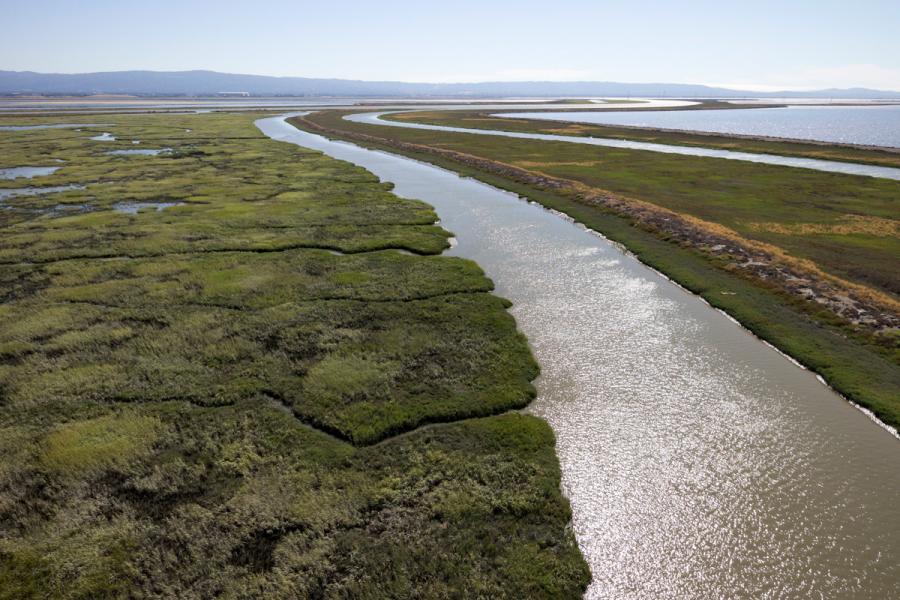South Bay Salt Ponds Restoration Project

$6,221,730 to Ducks Unlimited , Inc. for planning and construction and $1,200,000 to the California Wildlife Foundation for adaptive management monitoring and studies granted in 2018.
In 2019, an additional $600,00 was granted to Ducks Unlimited to complete construction designs, prepare bid documents, and prepare and submit permit applications needed to construct Phase 2 of the South Bay Salt Pond Restoration Project at Eden Landing Ecological Reserve.
Southern San Francisco Bay below San Mateo Bridge, Ravenswood and Alviso Pond Complexes. West Bay, South Bay and East Bay Regions.
Planning; Permitting; Design; Construction/Implementation; Monitoring
Vital Fish, Bird and Wildlife Habitat Program; Integrated Flood Protection Program; Shoreline Public Access Program.
California Wildlife Foundation, US Fish and Wildlife Service, California Department of Fish and Wildlife, State Coastal Conservancy, South Bay Salt Ponds Restoration Project partners, Save the Bay
Ravenswood R4 Breach Coverage
San Jose Mercury News: Restoring San Francisco Bay wetlands, one industrial salt pond at a time
CBS Bay Area: Project works to restore tidal marshlands along San Francisco Bay
2018 KQED feature on this project
South Bay Salt Ponds Restoration Project website
Eden Landing Restoration video
Staff Recommendation in the First Round of Funding
2023 UPDATE: On December 13, 2023, the South Bay Salt Pond Restoration Project partners and the U.S. Fish and Wildlife Service opened the 300-acre Ravenswood R4 Pond to the Bay with a celebration marking the 20th anniversary of their joint restoration venture. This major milestone event is part of an ambitious 50-year effort to restore 15,000 acres of historic wetlands to tidal marsh and other habitats.
***
2022 UPDATE: At the Ravenswood site, managed pond enhancement work was initiated and is now nearly complete. Four new water control structures were installed that will allow land managers to move water in and out of the ponds more rapidly in order to meet water quality objectives and create preferred habitat conditions for shorebirds, waterfowl, and other pond-dependent wildlife. Construction of a habitat transition zone along the All American Canal was also under construction during this time period. At the Alviso Ponds, Ducks Unlimited completed the breaching and lowering of berms to improve tidal circulation. As part of the monitoring to support adaptive management, a Motus tower, which will be used to track birds tagged with electronic transmitters so that migratory behavior and patterns can be better understood, was installed at the Don Edwards National Wildlife Refuge’s Coyote Creek Field Station.
***
This project will provide the final funding necessary to complete Phase 2 of the South Bay Salt Pond Restoration Project (Phase 2) in the Ravenswood and Alviso Ponds and launch the next phase of the adaptive management science program.
One of the largest wetland restoration projects in the United States, the South Bay Salt Pond (SBSP) Restoration Project is a multiagency effort to restore 15,100 acres of former salt evaporation ponds in South San Francisco Bay in phases over a 50-year period.
Ducks Unlimited, Inc. (DU) will construct Phase 2 actions in the Ravenswood Ponds in order to create a 355-acre mosaic of tidal wetlands, upland transition zone, and managed pond habitats. In the 295-acre Pond R4, DU will breach levees, install ditch blocks, dredge pilot channels, and construct 15 acres of gently sloping upland transition zone along the edge of an existing landfill. DU will breach and lower the A19 berm in additional locations in order to improve tidal circulation in the 265-acre A19. By improving the connection to Bay’s waters and sediment, tidal vegetation in A19 is expected to substantially expand, providing additional habitat to the endangered and threatened species that have re-occupied A20 and A21.
This project includes $1,200,000 million for the California Wildlife Foundation (CWF) to oversee the applied studies and monitoring identified in the SBSP Restoration Project’s Adaptive Management Plan (AMP). The AMP outlines how the SBSP Restoration Project will implement the project in phases and learn from the results in order to better understand the significant scientific uncertainties associated with a project of this scale and to avoid undesirable environmental impacts.
On April 11, 2018, the Authority authorized $6,221,730 for planning and construction of several Phase 2 projects on the federally-owned portions of the SBSP Restoration Project, the Island Ponds and Ravenswood Ponds. DU’s original grant application also requested funding for planning, design, and permitting of the Phase 2 actions on the state-owned portion of the SBSP Restoration Project: the southern portion of the Eden Landing Ponds between Old Alameda Creek and the Alameda Creek Flood Control Channel. This funding was not included in the authorization since the Environmental Impact Report for Eden Landing was not yet complete. However, the Final Environmental Impact Report, South Bay Salt Pond Restoration Project, Eden Landing Phase 2 (Final Eden Landing Phase 2 EIR) for Eden Landing is now complete and was certified by the California Department of Fish and Wildlife (the CEQA lead agency) on May 15, 2019.
In 2019, the Authority approved an additional $600,000 for this project to provide DU with needed matching funds for the design and permitting of the Preferred Alternative proposed in the Final Eden Landing Phase 2 EIR. DU will complete the required construction documents for earthwork (levees, ecotone, berm breaches, channel excavation), water control structures, and design of trails and interpretative features; prepare and submit the required permit applications; and finally, complete the bid package documentation for hiring contractors. The activities proposed as part of Phase 2 at Eden Landing include tidal wetland restoration, creation of managed pond habitat, phased restoration of some ponds pursuant to an adaptive management process, improvement of flood protection features, as well as construction of habitat transition zones and public recreation features.
